
Reading & Resources
School Administrator, November 2016
Book Reviews
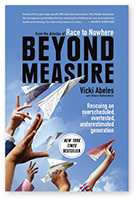 Beyond Measure: Rescuing an Overscheduled, Overtested, Underestimated Generation
Beyond Measure: Rescuing an Overscheduled, Overtested, Underestimated Generation
by
Vicki Abeles, Simon & Schuster, New York, N.Y., 2015, 304 pp. with index, $26 hardcover
Beyond Measure, written by Vicki Abeles, the director of the documentary film
Race to Nowhere provides a peek into the lives of youngsters across America.
This book will encourage you to reconsider the expectations we have placed on students. We have become a nation that focuses on metrics – test scores, credit hours, scheduling minutes – rather than on the joy of childhood, open time and flexible learning pathways. Abeles shares anecdotes about children and teens across the nation that are battling the stressors of school. Supported by research and evidence from leading pediatricians, Abeles makes a compelling argument that perhaps we need to reconsider the demands that we are placing on our nation’s youth. Never before have we seen the levels of anxiety, depression and stress that children are currently demonstrating. It needs to be a top concern for all educational leaders in all aspects of school leadership.
Abeles tackles the major components of most educational systems: scheduling, homework, testing and college admissions. The students’ stories are both compelling and disturbing. One student fell asleep behind the wheel due to the pressures of studying for major exams. Another child can’t stop worrying about her performance in high stakes classes. Learn about one pediatrician parent who set clear boundaries for homework and school activities infringing on evening family time.
Abeles shares some suggestions and tactics for transforming the student experience: cultivate a growth mindset for students; ease pressure on students who are worried about college entrance; educate parents on the emotional damage that can be done when undue pressures are placed upon students; and work together as a system to constantly evaluate the procedures that are in place so that they reflect what is in the best interest of students.
This book would be particularly useful as a district leadership and board member book study. District leaders often set calendars and procedures for district testing, school schedules and course offerings. Board members set policy around these topics, too. Students would benefit from these educational leaders reexamining the district practices that have been in place for years. Our challenge is to always do better for our students.
Reviewed by
Elizabeth Freeman, curriculum director, Fremont School District 79, Mundelein, Ill.
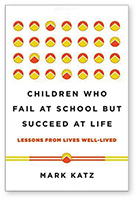 Children Who Fail at School But Succeed at Life: Lessons from Lives Well-Lived
Children Who Fail at School But Succeed at Life: Lessons from Lives Well-Lived
by
Mark Katz, W.W. Norton & Company, New York, N.Y., 2016, 304 pp. with index, $42 hardcover
We all wonder how some of our most at-risk kids become successful in life and we all want it to happen, but we don’t have all the answers as to why it happens. This text addresses the elements in life that can cause success to happen after an unsuccessful experience in school.
In
Children Who Fail at School But Succeed at Life, author Mark Katz, a clinical psychologist, lays out five basic “erroneous perceptions” on the paradoxical patterns of learning and behavior exhibited throughout one’s school experience. It’s these patterns of learning and behavior that parents and educators respond to and it’s their response that can cause unsuccessful outcomes.
The author divides the text into two parts: “Lessons from Lives Well-Lived” and “What Can Be.” In the first four chapters, the author reviews childhood years, resilience, emotional issues and how educators and parents have failed in our response to the perceived needs of kids. We have good intentions, but failed results. The final eight chapters illustrate five portraits of resilience in individuals who have succeeded in life after having a miserable time in school. The reader is often referred to web sites for further explanation and resources to learn more about how to help and further understand at-risk kids.
This text is directed toward all educators, but especially those who work with at-risk students. The mainstream educator needs the skills necessary to understand the emotional and behavioral issues of at-risk students to ensure a successful mainstream experience. We educators always talk of designing success for our children and this text gives us the resources necessary to achieve that goal. I would recommend requiring the text at the university level.
Reviewed by
Jerry Horgen, retired superintendent and adjunct professor, Capella University, Minneapolis, Minn.
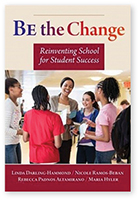 Be the Change: Reinventing School for Student Success
Be the Change: Reinventing School for Student Success
by
Linda Darling-Hammond,
Nicky Ramos-Beban, Rebecca Padnos Altamirano and
Maria E. Hyler, Teachers College Press, New York, N.Y., 2015, 264 pp., $34.95 softcover
Rich in content and inspiration,
Be the Change reminds educators everywhere that meaningful change is possible. The story chronicles the design, launch and ongoing operations of a small high school in East Palo Alto, Calif., that is created through a strong collaborative effort between researchers at Stanford University, practitioners, students, parents and community members.
Each chapter highlights one of the following critical elements found in the design process to be essential to student success: personalization; the creation of an academic culture; the development of high standards with high supports; the process of learning to teach so that students can learn; and the establishment of the school as a professional place. The research-based element is explicitly described as it is implemented in practice and comes to life through practitioner reflections and compelling narratives of student experiences.
The well-articulated mission and tightly aligned school design principles are helpful reminders of what works in schools. These high impact practices, applicable to all schools, are further delineated with easily adaptable operational tools, including rubrics and templates, provided in the appendices.
The content delivered in context is deep, informative and invaluable to anyone committed to leading socially just change. All leaders can empathize with the personal stories of students and educators who come together to courageously navigate uncharted territory in an effort to discover a better way forward.
One unique element that helps this book stand out among many excellent books about change is that it gives meaningful voice to the student experience. The student voice is a critical perspective that all district leaders can embrace as they seek to transform their schools to better serve all learners.
Reviewed by
Mary B. Herrmann, clinical assistant professor, University of Illinois at Urbana-Champaign
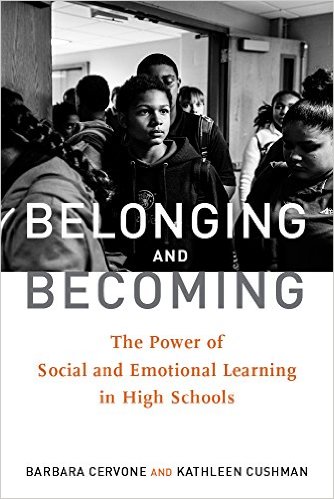 Belonging and Becoming: The Power of Social and Emotional Learning in High Schools
Belonging and Becoming: The Power of Social and Emotional Learning in High Schools
by
Barbara Cervone and Kathleen Cushman, Harvard Education Press, Cambridge, Mass., 2015, 232 pp. with index, $31 softcover
In
Belonging and Becoming, Barbara Cervone and Kathleen Cushman, co-founders of What Kids Can Do, Inc., convey the stories of five high schools where staff made the conscious decision to integrate social emotional learning (SEL) into their curriculum. Their choices and the implications for staff, students and the community are at the heart of this book.
This book is practical because of the rubrics, checklists and guidelines included in each chapter. Such items make this useful for administrators and other educational stakeholders who are considering the inclusion of social emotional learning in their high schools or those looking to examine and revise current practices.
As an administrator who works with staff dedicated to providing a well-rounded education that includes the required state and national standards while following the state and federal educational requirements, the prospect of engaging in SEL sometimes meets resistance rather than applause. Cervone and Cushman provide readers with a non-sugarcoated view of starting, implementing and reflecting upon the place of SEL in high schools.
Readers will find the text easy to follow. My copy is filled with sticky notes, handwritten notes in the margins and a few bent corners, much to the chagrin of my fellow bibliophiles. I plan to share it with my colleagues during an upcoming professional development workshop. I anticipate you will find it just as useful.
Reviewed by
Hope Blecher, director of curriculum and instruction, Secaucus, N.J., Public School District
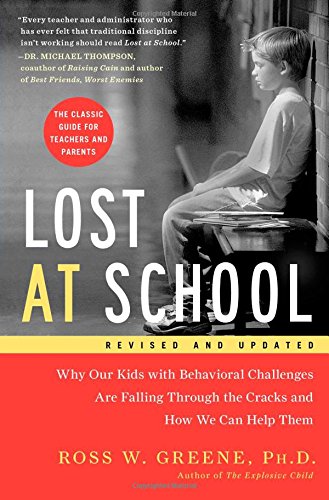 Lost at School: Why Our Kids with Behavioral Challenges are Falling Through the Cracks and How We Can Help Them
Lost at School: Why Our Kids with Behavioral Challenges are Falling Through the Cracks and How We Can Help Them
by
Ross W. Greene, Scribner, New York, N.Y., 2014, 336 pp. with index, $17 softcover
Every school superintendent has heard the litany of concerns raised by their faculty about how students today are different than students of the recent past. While some of the stories they hear speak of how students today are better able to handle the complex problems of our ever-changing world, they also hear stories of students who are disrespectful and out of control. While both groups of students present challenges, it is the second group that takes up an inordinate amount of administrative and support staff time in every school and district as groups of professionals seek out what seem to be the elusive answers on how best to address this group’s unique challenges and needs.
Author Ross W. Greene, associate professor in the department of psychology at Virginia Tech, suggests that the students who present the greatest behavioral challenges for educators in our schools today lack important thinking skills. He suggests that they have a “developmental delay” in “mastering the skills required for becoming proficient in handling life’s social, emotional and behavioral challenges.”
In the book’s second chapter, Greene presents the theoretical underpinnings of his approach. In a well-organized presentation, he introduces a useful list of skills most commonly lacking in students presenting with behavioral challenges. These missing skills, and how to address the deficiency, become the focus of the book.
In an approach that mirrors a case study examination, the author presents the stories of several students’ behavior and walks the reader through the exchanges they’ve had with their teachers. He then identifies the skill deficiency and continues the student’s story with the teacher utilizing a different and more effective strategic approach. Each chapter contains a Q&A section where practitioners present basic questions and concerns they have with the strategy depicted.
Lost at School presents one suggested approach to addressing the needs of students who present as behaviorally challenging in our classrooms. While the suggested approach is grounded in well-developed and tested strategies, the case study approach is likely too much for a school superintendent to get through.
This monograph is likely best suited for a school psychologist, principal or classroom teacher who can identify similarities to their own students or situations in the case studies.
Reviewed by
Charles V. Khoury, district superintendent, Ulster BOCES, Lake Katrine, N.Y.
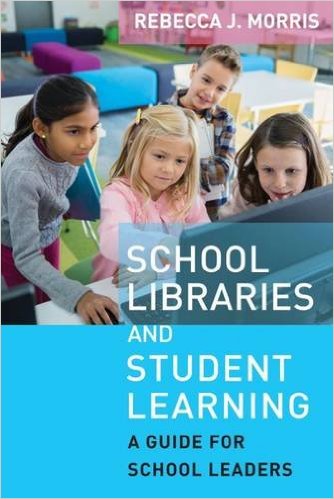 School Libraries and Student Learning: A Guide for School Leaders
School Libraries and Student Learning: A Guide for School Leaders
by
Rebecca J. Morris, Harvard Education Press, Cambridge, Mass., 2015, 232 pp. with index, $32 softcover
In the era of shrinking budgets and increased digital resources, school leaders are frequently asked, “do we still need a school library and librarian?” The answer is an emphatic “YES!” School librarians are trained as informational experts and serve as teacher, instructional partner, information specialist, program administrator and leader. Today’s librarians assist students, teachers, administrators, support personnel and parents in navigating and evaluating information that is available via the web.
Rebecca J. Morris, author of
School Libraries and Student Learning, is an assistant professor of library and information studies at the University of North Carolina and has served as a classroom teacher and school librarian. She has firsthand knowledge of the educational benefits and lifelong impact that a skilled school librarian has on all students, especially in the digital era.
The author provides ways to rethink the use of a school library so as to support and extend 21st-century learning to build interdisciplinary awareness, trans-literacy skills and collaboration among communities of learners.
Some of the chapters present short examples of librarians working with colleagues to explore topics related to cross-curricular reading, critical thinking, assessment, makerspaces and community engagement. Morris points to the librarian’s expertise, which is used to create unique learning opportunities that link to the school’s current curriculum in order to help understand and navigate the information available.
She also discusses practical applications for maximizing the school library such as flexible scheduling, extending information access and promoting teacher collaboration. As schools are required to better prepare students for college and careers, in addition to lifelong learning, it is imperative that the school library remain an integral part of that process along with a skilled information specialist; a school librarian.
Morris believes “. . . a strong school library has great potential to make learning, reading, and information personally relevant and important to students.” The library should be a focal point of the school and enable teachers to make learning rich and impactful.
The book has an easygoing presentation style and will assist school principals and other educational leaders in designing ways to further support cross-curricular literacy and teach informational responsibility.
Reviewed by
Edythe B. Austermuhl, superintendent, Berlin Township School District, West Berlin, N.J.
Why I Wrote this Book …
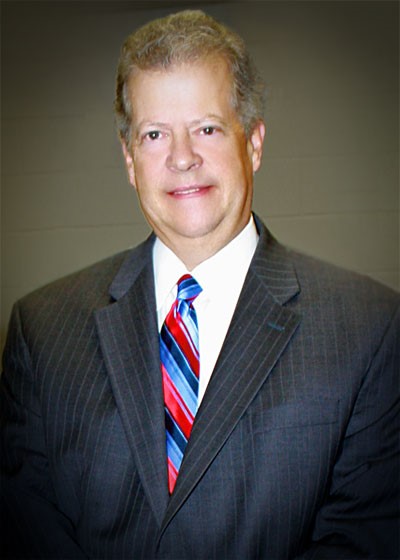 "Who stands up for our teachers and students? This novel is my attempt to answer the U.S. Department of Education’s ‘institutionalization of testing’ scheme that ensures a handsome profit for all involved. It takes a special group of individuals — the superintendent, his daughter (a special education student), a principal and a teacher — to fight the conspiracy as they encounter murder and kidnapping in their stance for students and teachers. … It’s a story that will inspire anyone who cares about the future of America’s schoolchildren.”
Joseph O. Cox Jr
"Who stands up for our teachers and students? This novel is my attempt to answer the U.S. Department of Education’s ‘institutionalization of testing’ scheme that ensures a handsome profit for all involved. It takes a special group of individuals — the superintendent, his daughter (a special education student), a principal and a teacher — to fight the conspiracy as they encounter murder and kidnapping in their stance for students and teachers. … It’s a story that will inspire anyone who cares about the future of America’s schoolchildren.”
Joseph O. Cox Jr., superintendent, Colonial Heights City Schools, Colonial Heights, Va., and AASA member since 1998, on writing
Cinnamon Snarl (Create Space, 2015)
ABSTRACT
Traits of 1:1 Leaders
Do superintendents involved in implementing a digital one-to-one transformation in their districts share any personal characteristics?
In a recent Ed.D. dissertation at Wingate University in North Carolina, Eisa Megan Cox examined three groups of superintendents: those who are implementing or have implemented one-to-one transformations, those who have not and those who are members of the Digital Promise League of Innovative Schools.
Using the Self-Assessment for Superintendents developed by COSN: Consortium for School Networking, Cox found superintendents in the Digital Promise league were most likely to demonstrate openness to innovation, a focus on building capacity with professional development related to pedagogy and learning, and continuous networking and collaboration. Superintendents who have not implemented one-to-one programs in their schools were least likely to display these characteristics.
Copies of “Profile of a Digital Superintendent” are accessible from ProQuest at 800-521-0600 or
disspub@proquest.com.
BITS & PIECES
Prospective Teachers
The National Center for Analysis of Longitudinal Data in Education Research has conducted a study of edTPA, an assessment that evaluates prospective teachers’ classroom performance.
New teachers who passed edTPA on their first try increased their students’ reading achievement scores more than those who didn’t, but the authors warn against screening out new teachers who fail the test the first time.
The working paper is at
http://bit.ly/prospective-teachers-performance.
Reading Support
“Foundational Skills to Support Reading for Understanding in Kindergarten Through 3rd Grade” is the topic of a new educator’s practice guide from the What Works Clearinghouse.
The guide has four recommendations for improving literacy skills: teach academic language skills, develop awareness of segments of sound in speech, teach students to decode words and ensure students read connected text every day.
Find the guide at
http://ies.ed.gov/ncee/wwc/PracticeGuide/21.
Autism Interventions
The National Council for Special Education in Ireland has published a literature review of interventions for children with autism spectrum disorder.
For school-aged children, peer-mediated interventions and multi-component social skills interventions were rated as having the most evidence of success.
The review is online at
http://bit.ly/interventions-for-autism.
Private Schools
The Institute of Education Sciences has released an evaluation brief comparing the characteristics of private schools accepting vouchers with those of public and charter schools in Washington, D.C.
Findings suggest that private schools are more likely to have features associated with a positive learning environment, but it is unclear whether teaching and instruction differ.
Find the brief at
http://bit.ly/compare-dc-schools.
Parenting Reviews
The Campbell Collaboration has compiled a policy brief that summarizes evidence from six systemic reviews of parenting programs.
Evidence shows that behavioral, group-based interventions improve child conduct, parental mental health and parenting skills in the short term for parents of children aged 3-12, but evidence for parents of younger children is less comprehensive.
Read the policy brief at
http://bit.ly/parenting-programs-brief.
New Superintendents Journal
New Superintendents Journal 2016-17 is a compilation of nine articles that originally appeared in
School Administrator. These are distributed via the state association. If you wish to purchase copies, contact Jimmy Minichello at
jminichello@aasa.org. The price is $10 plus shipping.
Conference Update
Political commentators James Carville and Mary Matalin; Jamie Vollmer, author and public education advocate; and Ravi Hutheesing, an artist entrepreneur and cultural diplomat, are the keynote speakers at the 2017 National Conference on Education.
AASA’s conference will be held in New Orleans, March 2-4. For more information about thought leaders, small group learning and the NCE marketplace and to register, visit
www.aasa.org.